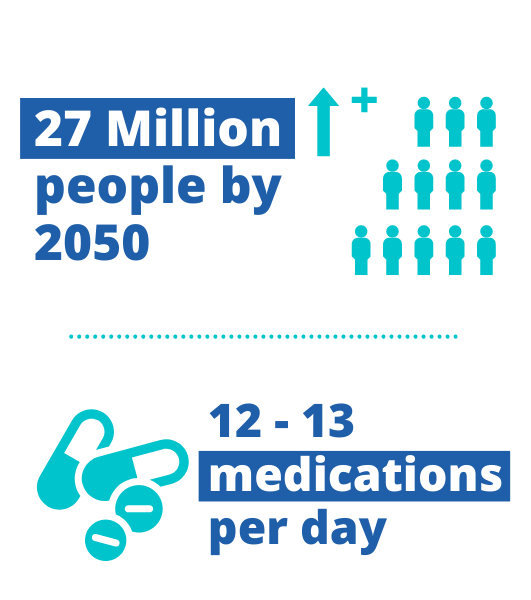Policymakers
About Senior Care Pharmacy Coalition (SCPC)
SCPC is the national organization representing long-term care (LTC) pharmacies in Washington, DC.
Operating in every state, SCPC’s LTC pharmacy members expertly serve approximately 850,000 patients daily with essential medications and oversight to improve health outcomes. SCPC represents the interests of its 325 members before Congress and the administration to ensure LTC pharmacies can serve patients with high-quality, affordable care, safely.
About Long-Term Care Pharmacies
LTC pharmacies serve one of our nation’s most vulnerable populations. A typical LTC pharmacy patient suffers from multiple complex and chronic conditions or has cognitive impairment, and requires 12-13 prescription medications a day. Our patients live in skilled nursing facilities (SNFs), assisted living facilities (ALFs), in the community and other long-term care settings. LTC pharmacies play an essential role in our health care system—one that is significantly different from and often more complex than that of a typical retail pharmacy.
Learn more about the collaborative role LTC pharmacies play in the U.S. health care system below:
Our Priorities
As the voice of the long-term care pharmacy community, SCPC’s policy priorities reflect the unique needs of our members and the patients they serve. LTC pharmacies play an essential role in our health care system—one that is significantly different from and often more complex than that of a typical retail pharmacy. Policy and regulations must reflect these differences.
Our advocacy efforts consider the diverse settings in which LTC pharmacies operate, including skilled nursing facilities, assisted living facilities, hospice, and home.
SCPC’s policy priorities are:
1
Establishing a sustainable payment model for LTC pharmacies.
2
Reforming abusive PBM practices to protect LTC pharmacies and the patients they serve.
3
Defining long-term care pharmacies at the federal level.
4
Ensuring access to essential LTC pharmacy services for LTC patients wherever they live.
Establishing a Sustainable Payment Model for LTC Pharmacies
Lowering drug prices shouldn’t unintentionally limit seniors access to essential pharmacy services. LTC pharmacies provide specialized services for vulnerable patients in long-term care. But without a critical fix to the broken LTC pharmacy payment model before January 1, 2026, many will not survive.
The Problem: New policies included in the American Rescue Plan and Inflation Reduction Act intended to lower drug prices unintentionally threaten the future of many LTC pharmacies and the millions of vulnerable patients they serve. Given the way Medicare Part D Plans and PBMs force LTC pharmacies to subsidize inadequate payment for their specialized services with revenues from expensive brand-name drugs, these policy changes inadvertently break the LTC pharmacy payment model. LTC residents rely heavily on insulin, inhalers, and 8 of the first ten drugs subject to Medicare-negotiated prices, leaving LTC pharmacies to face unsustainable financial losses from dispensing these medications.
The Solution: Congress must pass the LTC Pharmacy Fix to address these unintended consequences and save senior Rx care. The LTC Pharmacy Fix, which includes the creation of a new LTC pharmacy supply fee and specific PBM reforms, will ensure that Medicare Part D payments for LTC pharmacy services better reflect the actual cost of essential and legally required services. This commonsense solution will also address both the problem of inadequate dispensing fees and the problem of unfair contracts and predatory market practices driven by disproportionate PBM market power.

Resources

Issue Brief
Long-Term Care at Home
Ensuring LTC pharmacies’ role in the expanding home-based services and support
The Problem: As our population continues to age, LTC pharmacies provide wraparound clinical and consulting medication management services that keep people who need long-term care in the places they want to be – including their own homes. Public policy and regulations have not kept up with the rise in demand for LTC pharmacies and the crucial services provided to this population.
The Solution: To ensure the best outcomes for LTC patients, SCPC supports the creation of a federal payment platform that appropriately funds LTC pharmacy services, no matter the setting, so patients with long-term care, social, and supportive needs can still live at home in their community if they choose.

Resources

Issue Brief
-
Long-Term Care Pharmacy Services are Essential to Effective Expansion of Medicaid-Funded Home and Community-Based Services (HCBS)
View
Fair and Transparent PBM Practices
Regulating PBMs and protecting independent LTC pharmacies
Problem: PBMs engage in predatory business practices including opaque and unjustified fees for pharmacies and market consolidation across the pharmacy, distribution, insurance and healthcare provider sectors. Both practices can delay medication access, increase consumer costs, and force LTC pharmacies and other independent pharmacies to go out of business or sell to the PBM.
Solution: Congress must pass legislation that requires transparency in PBM drug pricing information and provides stronger regulations for CMS to hold PBMs accountable. Congress should also thoroughly investigate PBM business practices for violations of antitrust laws.

Resources

Issue Brief
-
Long-Term Care Pharmacies believe patients deserve affordable, cccessible medication; Pharmacy Benefit Managers put profit over care and refuse transparency
View

SCPC Comment Letters
-
Medicare Program: Contract Year 2023 Policy and Technical Changes to the Medicare Advantage and Medicare Prescription Drug Benefits Programs March 7, 2022
View -
Advance Notice of Methodological Changes for Calendar Year (CY) 2023 for Medicare Advantage (MA) Capitation Rates and Part C and Part D Payment Policies March 4, 2022
View -
Other PBM Comment Letters
View
LTC Pharmacy Impact
By the Numbers
Individuals in long-term care settings are often seniors and younger adults with disabilities who require long-term services and supports (LTSS) in addition to ongoing health care. LTC pharmacies are especially equipped to serve this population through medication management, 24/7/365 availability and in coordination with the patient’s health care team.
In the coming years, need for LTC pharmacies will continue to rise, as America’s long-term care population is expected to grow to 27 million people by 2050.
>The typical LTC patient needs approximately 12 to 13 prescription medications per day to manage their health.
>60% of LTC patients are 65 years or older and need help with everyday activities.
>14 million Americans nationwide require LTSS due to physical or cognitive disabilities or impairments that require care, which can include a combination of many different prescription medications each day to manage their health.
>A majority of LTC patients live in communal settings among other patients who may require different care and services provided by multiple caregivers.



